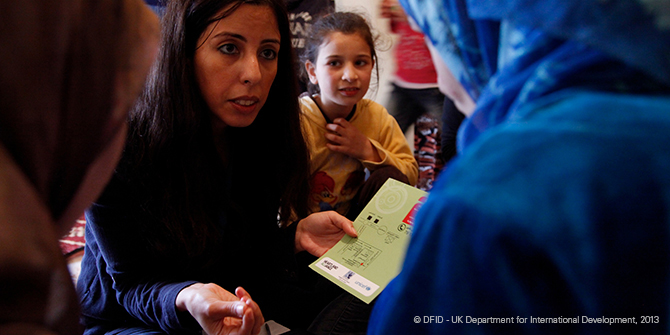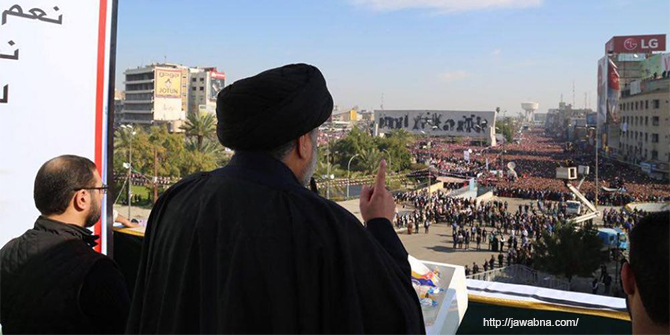by Ann-Christin Wagner
#LSERefugees

When I meet Abu Eisa, a well-established cook, he is busy preparing meals for poor Syrians for the first iftar of Ramadan. His hometown, Mafraq, a Jordanian border town close to Zaatari camp, is among the cities most affected by the influx of Syrian refugees, hosting around 100,000 Syrians and an equal number of Jordanians. Indignantly, Abu Eisa tells me: ‘When we bring iftar to poor people’s houses, I don’t work with aid organisations. All they want is taking pictures. Me, no. We call ahead and then just leave the food at the doorstep’.
Abu Eisa’s outcry points to an often overlooked aspect of humanitarian intervention: the role of aid agencies’ spatial practices in serving urban refugees, a core element of which constitute house visits. Complaining about the intrusive nature of these visits and the kind of objects and knowledge about refugees they produce leads us to reflect on underlying power dynamics in the exchange of humanitarian goods.
First, the practice of house visits is conditioned by the peculiarities of humanitarian aid in urban settings. In contrast to highly centralised aid delivery in refugee camps, it is characterised by a ‘shadow aid system’ where smaller NGOs work alongside UN organisations to provide services to refugees. Living in a provincial town like Mafraq, one is struck by the abundance of faith-based charities, semi-professional NGOs and even independent aid workers. In fact, many Syrian refugees in Mafraq have come to rely on the help of these smaller humanitarian actors and often receive support from more than one.
Within a diverse and – at times – obscure humanitarian landscape, the practice of house visits is closely linked to the ways aid is sought after and accessed. As many agencies in Mafraq do not have office space of their own, a common sight in Mafraq’s streets are groups of Syrians, mostly women, trying to spot representatives of humanitarian organisations – often equated with non-Arab foreigners – to sign up for aid. However, aid is usually delivered by car to Syrians’ homes.
Humanitarian practice of house visits deserves critical attention because these visits tend to cement unequal power dynamics between aid providers and recipients. In fact, the inequalities of mobility of aid workers and recipients are striking. As one frustrated Syrian woman complained to me: ‘We sit at home and wait, but no one ever comes’. Naturally, the contrast between highly mobile aid workers moving around in cars and immobile aid recipients adds to the image of refugees as passive objects of humanitarian care, especially in a city shaped by impaired female mobility, the near absence of cheap public transport and urban sprawl. In particular, aid workers’ cars become the very symbol of humanitarian aid ‘from above’, creating a physical divide between aid workers and recipients, while representing the space of humanitarian intervention as unsafe and in need of securitisation.
Another key battlefield where unequal power dynamics play out lies in aid workers’ dealings with codes of Arab hospitality. In Bedouin culture in the south of Syria and north of Jordan, hospitality is part of a key set of ethical and religious values, where not only one’s own, but also the tribe’s reputation is at stake. While tradition commands to feed, but also protect the visitor, it also comes with certain restrictions for the guest: ‘The guest is prisoner of the host’, as Jordanians say.
By interrupting customary choreographies of hospitality, aid workers replicate power inequalities within Syrian houses. They refuse refreshments, and often intrude into areas beyond the madafa, the traditional reception room for guests, breaking into private areas reserved for women, for the sake of assessing Syrians’ living situation. Moreover, while hosting one’s guest is traditionally an occasion for staging acts of oral history and carving collective identities, many aid workers speak poor Arabic and work on a tight schedule. As a consequence, customary ways of relating one’s life are being replaced by standardised interviews, Syrians encouraged to professionalise short narratives of flight and life in displacement –typical ‘refugee stories’ focused on neediness. Adding to this, many aid workers coerce Syrians into being photographed for the sake of agencies’ promotion material, producing images beyond their control and introducing moral standards of gratitude: A standard picture shows a smiling Syrian holding blankets or other goods. Finally, while Syrians leave multiple written and pictorial traces in aid agencies’ archives and social media, the latter often remain under the radar and do not even leave contact details. For Syrians, it thus becomes impossible to track down one-time visitors or hold them accountable for promised services.
Most importantly, the hand-over of goods and cash contradicts the non-transactional nature of Arab hospitality, implicitly calling the host’s sincerity into question. In a dull urban environment like Mafraq, without doubt many Syrians enjoy house visits because of their entertainment value; however, they also bear a degrading connotation. As one foreign volunteer remarked to me while handing over a plastic bag of used children’s clothes: ‘Now we will feed the animals’.
Not that Syrians are irresponsive to the reversal of basic cultural norms. Inviting aid workers for follow-up visits without aid delivery may restore the host’s role as the giver. Others expose the violation of hospitality codes more subtly by not serving drinks.
Finally, not all humanitarian actors disrespect hospitality codes; members of a local church pay their respects to their hosts by framing aid delivery as a customary ‘visit’ and hand over goods as ‘presents’. When recognised, codes of hospitality can even form the basis of a good working relationship between aid providers and recipients.
 Ann-Christin Wagner is a PhD candidate in International Development at the University of Edinburgh and affiliated with the Institut Francais du Proche-Orient in Amman. Her research focuses on the role of ‘waiting’ and stalled mobilities in protracted displacement. She is currently conducting one year of ethnographic fieldwork with urban Syrian refugees in the north of Jordan, while also volunteering as an interpreter with an international NGO. She tweets at @ann_wagner_ed.
Ann-Christin Wagner is a PhD candidate in International Development at the University of Edinburgh and affiliated with the Institut Francais du Proche-Orient in Amman. Her research focuses on the role of ‘waiting’ and stalled mobilities in protracted displacement. She is currently conducting one year of ethnographic fieldwork with urban Syrian refugees in the north of Jordan, while also volunteering as an interpreter with an international NGO. She tweets at @ann_wagner_ed.







it is important issue that people talk about it but not explicitly
it happens also not for refugees only, but also with beneficiaries of other aid and develpment projects
Thank you for the deep analysis post you have made.The article is quite inspiring.